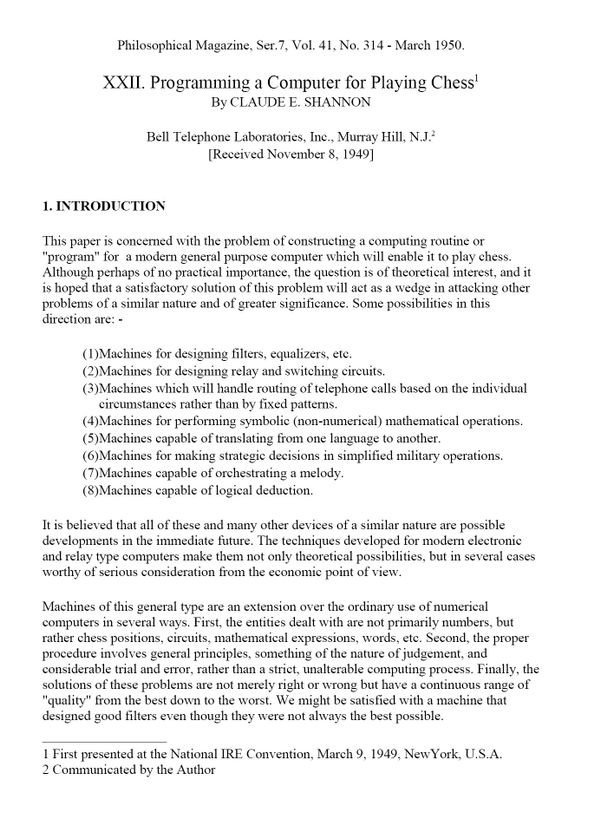
Intro
I recently had a brief exchange with @lighteye, who mentioned me in his article Mate in 19!? In the comments he invited me to examine a series of posts he has previously published that he entitled THE WAR: Debunking 'AI'. The title is partially self-explanatory, but it is only after reading the text that one better understands his views. Hence I invite you to read his posts and contrast your opinion on the matter.
That is what I propose to do here, accepting @lighteye's invitation. I will react to his first article entitled THE WAR: Debunking ‘AI’ – Chess Intro (Part I of III) which discusses two of my favorite topics: AI and chess. I will go through his ideas mostly in the order of his paragraphs, quoting verbatim to better represent him. I will publish my reaction in two parts.
I hope that with this reaction the curious readers can learn a little more, clear their doubts and continue to form an educated opinion on the topic. Let's begin.
"Debunking ‘AI’ – Chess Intro" Debunked Part 1
I'm fed up with idiots who has their hair on fire about how Artificial Intelligence (AI) is going to kill us all. It won't, because Artificial Intelligence doesn't exist. Natural stupidity is the real danger... (Lighteye.)
It is true that heated comments have been made regarding the rise of Artificial Intelligence and the possibility that we may lose control over it as it progresses, and it is progressing fast. There are mixed opinions between the technophiles and the technophobes.
What I have noticed is that experts in the field tend to downplay these concerns, especially when they are projected in such an apocalyptic, movie-like manner. However, that's not the end of the debate, there's a lot to be said there. If you want to read more about it, I've written about it here.
Regarding that it won't happen because "Artificial Intelligence" doesn't exist, my a priori answer is that this is not true. Artificial Intelligence does exist, but I will wait to hear more of the author's arguments to have a more accurate posteriori judgment. The same applies to the idea of "natural stupidity".
We will begin this series with a statement that I have made before: The sinister Centralized Hierarchical Political Matrix controls the people by imposing terminology that has nothing to do with the truth, and which creates a virtual world – if you accept the terminology, you have accepted to live in a lie! (Lighteye).
Well, "The sinister Centralized Hierarchical Political Matrix" is very curious. Is it just a rhetorical device? It is true that terminology plays an important role in how ideas are projected. It is relevant in politics, where we see that politicians change the names of their policies and social programs in order to exclude or include certain ideologies.
In the case of the term Artificial Intelligence it is not known to have been the product of a hidden political agenda. It is rather the term coined by John McCarthy in 1956. He was a scientist and mathematician. He introduced the term at a conference held at Dartmouth College, an academic event.

⬆️ John McCarthy (1927 - 2011) one of the pioneer researchers in AI (picture: Wikimedia Commons)
The name Artificial Intelligence was controversial from the start among experts, and competed with others such as Heuristic Programming, but it caught on and would soon describe lines of research and engineering.
To begin with, in this text we will make an introduction to the demystification of ‘Artificial Intelligence’ by dispelling the crowning ‘proof’ purported by the people who do not know what they are talking about: “Man can no longer beat a machine in chess!” Nonsense… (Lighteye.)
Ok, let's hear what it's all about. What strikes me is the recrimination that there are "people who do not know what they are talking about", as this tends to happen a lot in the era of Web 2.0 and now Web 3.0, where people feel empowered to communicate and present their ideas as great truths no matter how unfounded and methodologically suspect they are. That happens a lot in social networks like Hive as well.
Chess is not a game of intelligence, but a game of memory (Lighteye).
Memory is crucial for professional chess players, yes. They need to learn tons of opening and endgame variations. This is what Lighteye explained in his other post, I think, where he linked to this topic. However, his statement that "Chess is not a game of intelligence, but a game of memory" does not seem to capture the essence of chess, especially in the context of Artificial Intelligence and Computer Science.
From a Game Theory point of view, chess is a zero-sum game and a game of perfect information, meaning, your gains translate exactly into losses for your opponent and where both you and your opponent, in theory, have access to the same information from start to finish.
Chess is also a game of high complexity, that is, the graph that can be constructed to reach all possible positions (nodes) from every move (edge) is of a very high order. When Claude Shannon made this calculation, he estimated it at 1120, and more recently it is estimated to be around 1123. It should be noted that these calculations do not include illegal positions, which would make the complexity higher. It should also be noted that without the triple repetition and 50 move rules, the chess tree is potentially infinite.
The point behind this complexity is that it is very hard to compute. Claude Shannon was, in fact, one of the first theorists to talk about how the game of chess could be solved and he talked about the brute force method, which is trying every possible move until you find the best one. Applying brute force is a valid approach, but is very wasteful. Hence it was refined with evaluation functions and pruning techniques, which are things he also talks about in his iconic paper. That was the way chess engine programming had been carried out for over 50 years, a whole paradigm that relies on heuristics.

⬆️ Programming a Computer For Playing Chess, a famous paper by Claude Shannon from 1950 (picture: screenshot from a PDF).
Now, to be fair, there is one approach where it can be argued that chess is a memory game from a computational point of view. This is the endgame database (tablebase). These are a collection of games involving a reduced number of pieces. All possible games with seven pieces or less have been calculated using brute force. That tree of games is huge and weighs about 140 terabytes! and that in spite of being only positions with seven pieces.
In computer theory, this type of resource (tablebase) is known as Oracle: If you have perfect knowledge, you will have a perfect evaluation and you will know which is the perfect game. This would be equivalent to solving the chess tree.
The problem is that WE DO NOT HAVE THAT PERFECT KNOWLEDGE IN CHESS. Calculating and storing the tablebase of 32 pieces (those that chess has) is practically impossible even with current capabilities, because as we said, it is a very large complexity: it would take millions of years and would occupy a huge storage space, if it is even physically possible. Only quantum computing could offer us something there.
This brings us to the first base again: We cannot and should not approach chess with brute force methods, but with "intelligent" methods. The real problem lies in developing algorithms to find more efficient routes with the available resources and these are valid problems in research programs. It is in approaching chess computationally, trying to make a program traverse the most promising branches of the chess tree where the heart of the matter lies.
We were well aware of this even before Shannon made his calculation. We needed to model and implement a system that was able to make optimal decisions by itself to solve a problem and it did it using heuristic algorithms, among other techniques. So the qualities mentioned (zero-sum game, perfect information game, high complexity game) made chess a tool par excellence for Artificial Intelligence research, to the point that it became the drosophila meganogaster of AI.

⬆️ The fruit fly or drosophila meganogaster, an iconic species in genetic research. Hence the comparison with chess (picture: Wikimedia Commons)
Not only that, but it was previously popular to think that doing so could help us further understand how aspects of human intelligence work, and that is precisely what inspired Grandmaster Alexander Kotov when he proposed his controversial Analysis Tree Method.
Well, there is a lot more to say here, but we have to move on. The point is that chess is not best described as a game of memory in computational terms, but as a zero-sum game of perfect information and high complexity, which made it ideal for research.
Intelligence cannot be measured by only one highly abstract game of memory, no matter how complicated it may be. (Lighteye.)
Since we have already seen that from a mathematical and computational point of view chess is not better described as a "memory game", we would be tempted to conclude that this premise lacks merit, but it isn't the case. In fact, the consequent can be true even if your antecedent is false, though of course that does not make it a valid argument.
In other words, it is true that intelligence cannot be measured solely by chess, even if chess is considered a memory game. This is true as long as we have a different definition of intelligence than the operational definition that the chess engine developers had in mind.
We can see that the words we use can mislead us in not only sensitive, biased and political issues, but also in issues like this one. Any vague term, such as "Intelligence" in common parlance, will allow any sort of flaws in a rational discussion.
In the next installment we will see how @Lighteye continues to elaborate on this and the rest of his post.
Notes
- Most of the sources used for this article have been referenced between the lines.
- Unless otherwise noted, the images in this article are in the public domain or are mine.
